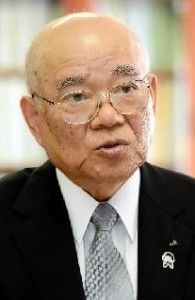Why abandon nuclear power?: Compromised food security would be fatal blow
Nov. 9, 2012
Interview with Mitsuo Murakami, vice president of the Central Union of Agricultural Cooperatives
by Akihiko Kanetani, Editorial Writer
At its triennial general conference last month, the Japan Agricultural Cooperatives (JA) group decided on an action policy that includes working toward “future abandonment of nuclear power.” This is the first time JA, whose members are primarily farmers, has announced a policy supporting an end to Japan’s reliance on nuclear power. The Chugoku Shimbun asked Mitsuo Murakami, 70, president of JA Group Hiroshima and vice president of the Central Union of Agricultural Cooperatives (JA Zenchu), about the reasons for the new policy and measures that will be taken. The following are excerpts from that interview.
Why did the JA group come out in favor of abandoning nuclear power?
Nearby farmland was contaminated by radioactive materials as a result of the accident at the Fukushima No. 1 (Daiichi) nuclear power plant. A lot of areas are off limits and must remain in their ruined state. Farmers work with nature to produce their agricultural products. That is our occupation. If the natural environment is destroyed or contaminated, we cannot make a living.
We have worked hard to provide us with a safe and secure food supply. If we can’t persuade consumers’ of the basic safety of the food supply, it will be a fatal blow to agriculture.
In August a support team composed of members of JA cooperatives in Hiroshima Prefecture went to Fukushima Prefecture.
About 20 people went to the city of Fukushima and helped with the measurement of radiation in the soil of peach orchards and vineyards. This is a daunting task that has to be done meticulously. The staff members who joined the support team were surprised by how much had to be done and gained a renewed awareness of the tremendous impact of the nuclear accident.
I heard that you also have personal feelings with regard to denuclearization.
My father was an atomic bomb survivor, and he was often ill. He was in the Eba area in Hiroshima at the time of the A-bombing, and afterwards he walked around the city. My father’s poor health was one reason I began farming right after I graduated from college.
I fully believed that the peaceful use of nuclear power was safe. After seeing what happened in the nuclear accident in Fukushima, I felt ashamed that I’d been so naive. After the accident I was determined to get denuclearization into the JA group’s action policy, so I lobbied the members and got their agreement.
Nevertheless “future abandonment of nuclear power” seems a rather vague expression.
There are agricultural cooperatives in areas where nuclear power plants are located, and some people questioned whether it was OK to get this involved in the issue as a group. It was partly an effort to get the entire organization united on the “future” rather than taking immediate action on denuclearization. People have various opinions on nuclear power, but at least we are sympathetic when it comes to this issue. I felt it was necessary to indicate our direction in favor of denuclearization.
What specific efforts will you make toward denuclearization?
In order to make it possible to avoid relying on nuclear power we will make more use of local renewable energy sources. The JA group is actively working on the use of small-scale hydroelectric power generation. We operate 37 facilities in the Chugoku Region, mainly in Hiroshima Prefecture, which represent the majority of the facilities in Japan. Japan is blessed with a lot of water, so why not make use of it? In hilly and mountainous areas there are many areas with high waterfalls that are suitable for this purpose. If we generate more power with small-scale hydro, use the power for greenhouse cultivation and sell some of it, it will lead to the revitalization of these mountainous areas.
You are also calling for expanded use of solar power.
The JA group has large-scale agricultural facilities such as rice centers and product collection sites. A system for the purchase of renewable energy at a fixed price has been implemented, and we are planning to put solar panels on the roofs of agricultural facilities and sell power. The National Federation of Agricultural Cooperative Associations has set up a new solar power company with Mitsubishi Corporation.
The Democratic Party administration has called for an end to the reliance on nuclear power by the 2030s. What is your assessment of that?
We don’t intend to link the JA group’s policy on denuclearization with our stance on politics. We are opposed to the Trans-Pacific Partnership (TPP). In the next general election we won’t be looking at whether candidates belong to the Democratic Party or the Liberal Democratic Party. Instead we will support those who oppose the TPP.
Many in the business community feel strongly that Japan should continue to use nuclear power.
People raise the issue of costs, but when you include things like grants for regional development it’s not clear whether or not nuclear power is really inexpensive. With regard to power shortages as well, it doesn’t seem that the actual demand for power has been clearly shown. And the problem of the final disposal of spent nuclear fuel has not been solved, so I have to say that it’s still an imperfect technology.
Mitsuo Murakami
Native of Miyoshi, Hiroshima Prefecture. Graduate of the Faculty of Agriculture at Okayama University. Served as auditor, director and president of the JA cooperative in the former Sanwa-cho before becoming president of JA Miyoshi in 1995. Served as managing director and vice president of JA Group Hiroshima before becoming president in 2006. Has promoted local production for local consumption and worked to develop the next generation of farmers. Became vice president of JA Zenchu last year.
(Originally published on November 7, 2012)








